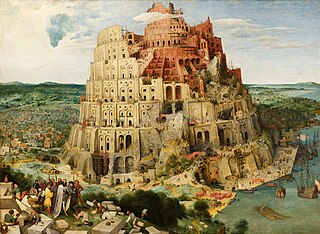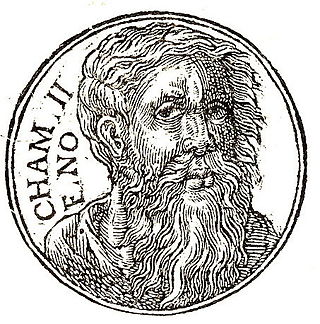
The Tower of Babel narrative in Genesis 11:1–9 is an origin myth and parable meant to explain why the world's peoples speak different languages.
The Book of Ether is one of the books of the Book of Mormon. It describes the Jaredites, descendants of Jared and his companions, who were led by God to the Americas shortly after the confusion of tongues and the destruction of the Tower of Babel. Ether consists of fifteen chapters.

Ham, according to the Table of Nations in the Book of Genesis, was the second son of Noah and the father of Cush, Mizraim, Phut and Canaan.

The Jaredites are one of four peoples that the Latter-day Saints believe settled in ancient America.
The Hittites, also spelled Hethites, were a group of people mentioned in the Hebrew Bible. Under the names בני-חת and חתי they are described several times as living in or near Canaan between the time of Abraham and the time of Ezra after the return of the Jews from the Babylonian exile. Their ancestor was Heth.

In the Book of Mormon, the Brother of Jared is the most prominent person in the account given in the beginning of the Book of Ether. The Brother of Jared's name is not given in the text of the Book of Mormon but Joseph Smith stated in 1834 that it was Mahonri Moriancumer.
The House of Joseph is a designation which members of the Church of Jesus Christ of Latter-day Saints apply to the ancient "birthright" tribe of the house of Israel (Jacob) as it is described in the Old Testament, made up of the tribes of Ephraim and Manasseh. The tribes' namesakes — the two sons of Joseph of Egypt — are first mentioned in Genesis 41:50-52.

According to the Book of Mormon, Ether is a Jaredite prophet, one of the last surviving Jaredites, and primary author of the Book of Ether.

Psalm 104 is the 104th psalm of the Book of Psalms, beginning in Hebrew “ברכי נפשי” ; in English in the King James Version: "Bless the LORD, O my soul. O LORD my God, thou art very great". In the slightly different numbering system used in the Greek Septuagint and the Latin Vulgate version of the Bible, this psalm is Psalm 103. In Latin, it is known as "Benedic anima mea Domino".

Psalm 89 is the 89th psalm of the Book of Psalms, beginning in English in the King James Version: "I will sing of the mercies of the LORD for ever". In the slightly different numbering system used in the Greek Septuagint and Latin Vulgate translations of the Bible, this psalm is Psalm 88. In Latin, it is known as "Misericordias Domini in aeternum cantabo". It is described as a maschil or "contemplation".

Gazelem (;) is a person mentioned in the Book of Alma, within the Book of Mormon.

In the Book of Ether in the Book of Mormon, Jared was the primary ancestor of the Jaredites. He is not to be confused with another Jared, a later Jaredite king who dethroned his father, Omer.

Psalm 50, a Psalm of Asaph, is the 50th psalm from the Book of Psalms in the Bible, beginning in English in the King James Version: "The mighty God, even the LORD, hath spoken, and called the earth from the rising of the sun unto the going down thereof." In the slightly different numbering system used in the Greek Septuagint and Latin Vulgate translations of the Bible, this psalm is Psalm 49. The opening words in Latin are Deus deorum, Dominus, locutus est / et vocavit terram a solis ortu usque ad occasum. The psalm is a prophetic imagining of God's judgment on the Israelites.

Psalm 68 or Psalm 67 in Septuagint and Vulgate numbering is "the most difficult and obscure of all the psalms." In the English of the King James Version it begins "Let God arise, let his enemies be scattered". In the Latin Vulgate version it begins "Exsurgat Deus et dissipentur inimici eius". It has 35 verses. Methodist writer Arno C. Gaebelein calls it "The Great Redemption Accomplished" and describes it as "one of the greatest Psalms".

Psalm 71 is the 71st psalm of the Book of Psalms, beginning in English in the King James Version: "In thee, O LORD, do I put my trust: let me never be put to confusion". It has no title in the Hebrew version. In the slightly different numbering system used in the Greek Septuagint and Latin Vulgate translations of the Bible, this psalm is Psalm 70. In Latin, it is known as "In te Domine speravi".

Moron is the name of a location and a king in the Book of Ether in the Book of Mormon. They are both connected with the Jaredite people.

Jaredite kings are a series of monarchs described in the Book of Mormon, comprising chapters 6:22-15 of the Book of Ether. As death was approaching Jared and his brother, gathered together the Jaredite people to ask them what they desired of them before they died. The people then requested that they anoint one of their sons as king. This was grievous to them, and the brother of Jared remarked that "surely this thing leadeth into captivity." Despite his brother's misgivings, Jared pressed him to allow the establishment of a Jaredite kingship at which suggestion the brother of Jared yielded.
According to the Book of Mormon, the Jaredites are a people who lived in ancient America shortly after the confounding of the languages at the Tower of Babel and are written of principally in the Book of Ether. The Lineage of the Ether is written in The Book of Ether, chapter 1 verses 6-33. Most individuals are only briefly mentioned in the narrative of the Book of Ether. Each is notable in that he is a descendant of Jared, an ancestor to Ether, and most were also Kings of the Jaredites.
"The Ballad of Cassandra Southwick" is a poem written by American Quaker poet John Greenleaf Whittier in 1843. It details the religious persecution of Cassandra Southwick's youngest daughter Provided Southwick, a Quaker woman who lived in Salem, Massachusetts and is the only white female known to be put up at auction as a slave in the United States.

In the book of Ether found in the Book of Mormon, King Coriantumr (/ˌkɒriˈæntəmər/) was the last Jaredite along with the prophet Ether. He and his family lived wickedly, rejecting Ether's invitation to change their ways. Over the course of his reign, many people try to take the kingdom from Coriantumr. In an effort to preserve his kingship, he wages war with the men who desire his sovereign position, including Shiz. The two men participate in a great last battle with their armies at the Hill Ramah, where Coriantumr decapitates his enemy. With the armies annihilated and only two Jaredites left alive, himself included, Coriantumr wanders through the land and is discovered by the people of Zarahemla, who are a remnant of the Mulekites. He lives the rest of his life in Zarahemla, dying shortly thereafter.










